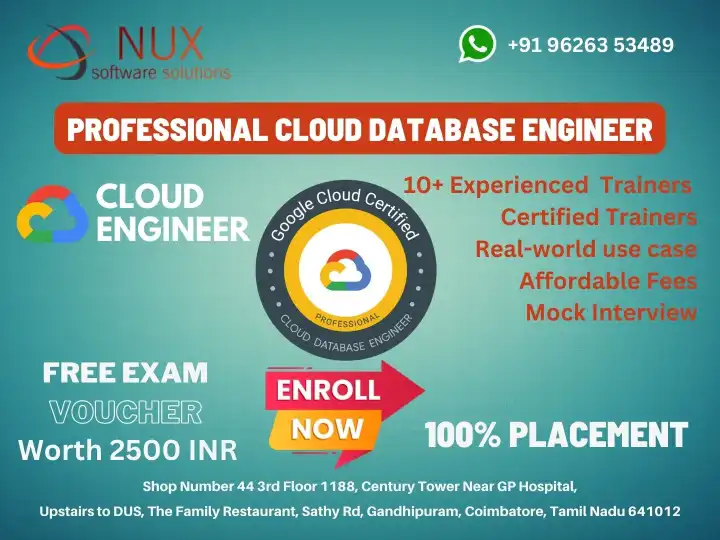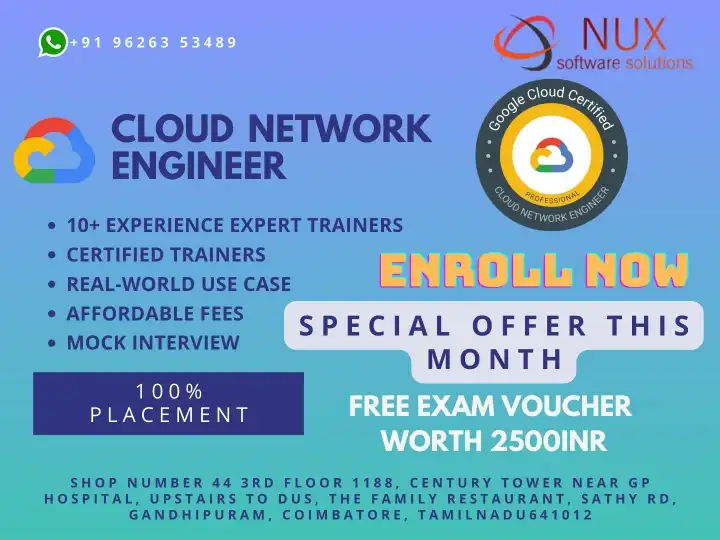Professional Cloud Database Engineer Training and Certification in Coimbatore

Professional Cloud Database Engineer Training – Advanced Database & Cloud Mastery
Course Overview
The Professional Cloud Database Engineer Training is an advanced, industry-focused program designed to equip learners with specialized skills in cloud database architecture, database administration, performance optimization, and cloud-native database solutions. This course is ideal for individuals aiming to become certified cloud database engineers or senior database administrators managing enterprise-scale database systems in cloud environments.
Offered by Linux Training Center, Coimbatore, this program covers major cloud platforms including AWS RDS, Azure SQL Database, Google Cloud SQL, and MongoDB Atlas while providing extensive hands-on experience with database design, migration, security, and automation, ensuring students gain both architectural knowledge and practical implementation skills required for high-level database engineering roles.
Who Should Enroll?
- Database administrators seeking cloud database expertise
- Software developers transitioning to database engineering roles
- System administrators wanting to specialize in cloud databases
- IT professionals pursuing cloud database certifications
- Data engineers looking to enhance database management skills
- Experienced DBAs planning to migrate to cloud platforms
Why This Course Stands Out
- Comprehensive coverage of multi-cloud database platforms and services
- Advanced database performance tuning and optimization techniques
- Real-world database migration projects from on-premises to cloud
- Enterprise-grade security, backup, and disaster recovery implementation
- Hands-on experience with automated database provisioning and scaling
- Industry best practices for database architecture and cost optimization
- Preparation for cloud database certification paths
Career Roles You Can Pursue
- Cloud Database Engineer
- Senior Database Administrator
- Database Architect
- Cloud Solutions Architect (Database Specialty)
- Database Migration Specialist
- Site Reliability Engineer (Database Focus)
- Data Platform Engineer
- Database DevOps Engineer
Why Choose Linux Training Center, Coimbatore?
- Expert instructors with cloud database certifications and enterprise experience
- Dedicated cloud lab environment with multi-platform access
- Flexible training options: weekday, weekend, and intensive bootcamp formats
- Real-world projects involving database design, migration, and optimization
- Industry-standard tools and cloud platform credits for hands-on practice
- Mock interviews, portfolio development, and advanced certification preparation
- Placement assistance with top IT companies and cloud consulting firms
- Ongoing mentorship and professional network access
Advance your career with specialized cloud database engineering skills. This professional-level training prepares you for high-demand, high-salary database roles in the cloud-first enterprise landscape.
Professional Cloud Database Engineer Training Course Syllabus
Modules
Section 1: Design scalable and highly available cloud database solutions (~42% of the exam)
1.1 Analyze relevant variables to perform database capacity and usage planning. Activities include:
●Given a scenario, perform solution sizing based on current environment workload metrics and future requirements
●Evaluate performance and cost tradeoffs of different database configurations (machine types, HDD versus SSD, etc.)
●Size database compute and storage based on performance requirements
1.2 Evaluate database high availability and disaster recovery options given the requirements. Activities include:
●Evaluate tradeoffs between multi-region, region, and zonal database deployment strategies
●Given a scenario, define maintenance windows and notifications based on application availability requirements
●Plan database upgrades for Google Cloud-managed databases
1.3 Determine how applications will connect to the database. Activities include:
●Design scalable, highly available, and secure databases
●Configure network and security (Cloud SQL Auth Proxy, CMEK, SSL certificates)
●Justify the use of session pooler services
●Assess auditing policies for managed services
1.4 Evaluate appropriate database solutions on Google Cloud. Activities include:
●Differentiate between managed and unmanaged database services (self-managed, bare metal, Google-managed databases and partner database offerings)
●Distinguish between SQL and NoSQL business requirements (structured, semi-structured, unstructured)
●Analyze the cost of running database solutions in Google Cloud (comparative analysis)
●Assess application and database dependencies
Section 2: Manage a solution that can span multiple database solutions (~34% of the exam)
2.1 Determine database connectivity and access management considerations. Activities include:
●Determine Identity and Access Management (IAM) policies for database connectivity and access control
●Manage database users, including authentication and access
2.2 Configure database monitoring and troubleshooting options. Activities include:
●Assess slow running queries and database locking and identify missing indexes
●Monitor and investigate database vitals: RAM, CPU storage, I/O, Cloud Logging
●Monitor and update quotas
●Investigate database resource contention
●Set up alerts for errors and performance metrics
2.3 Design database backup and recovery solutions. Activities include:
●Given SLAs and SLOs, recommend backup and recovery options (automatic scheduled backups)
●Configure export and import data for databases
●Design for recovery time objective (RTO) and recovery point objective (RPO)
2.4 Optimize database cost and performance in Google Cloud. Activities include:
●Assess options for scaling up and scaling out.
●Scale database instances based on current and upcoming workload
●Define replication strategies
●Continuously assess and optimize the cost of running a database solution
2.5 Determine solutions to automate database tasks. Activities include:
●Perform database maintenance
●Assess table fragmentation
●Schedule database exports
Section 3: Migrate data solutions (~14% of the exam)
3.1 Design and implement data migration and replication. Activities include:
●Develop and execute migration strategies and plans, including zero downtime, near-zero downtime, extended outage, and fallback plans
●Reverse replication from Google Cloud to source
●Plan and perform database migration, including fallback plans and schema conversion
●Determine the correct database migration tools for a given scenario
Section 4: Deploy scalable and highly available databases in Google Cloud (~10% of the exam)
4.1 Apply concepts to implement highly scalable and available databases in Google Cloud. Activities include:
●Provision high availability database solutions in Google Cloud
●Test high availability and disaster recovery strategies periodically
●Set up multi-regional replication for databases
●Assess requirements for read replicas
●Automate database instance provisioning



